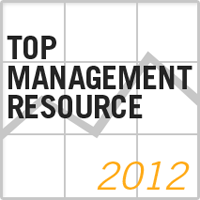The calendar is turning toward May, which means as a professor, the academic year is drawing to an end. As a SHRM Student Chapter Advisor of 15+ years, it means state and regional student HR conference have passed, the merit award application is frantically being completed for submission (due today!), and I am bidding a sad farewell to the latest graduates who are off to greener pastures.
It also means an opportunity to look review what worked, and what didn't work as a SHRM Advisor - what is the state of SHRM College Relations? We are in the unique position of having a new leader hired at SHRM - Tara Fournier, PHR. After an exhaustive 7 month search, Tara was hired to be the Manager of Member Engagement, who will focus not only on College Relations, but the Young Professionals network. She had a trial by fire, so to speak, as within the first few weeks she was already traveling the country to attend the various regional student HR conferences
To assist in her transition in the role, here is one chapter advisor's unsolicited wish list I'd like to see Tara pursue during her first full year in the position:
1. Rehaul the Merit Award - While the merit award for student chapters moved from a point system to a check system several years ago to mirror what professional chapters do, it has become outdated and activities are not evenly rated. For example, to earn a single checkmark, section 4.1 suggests chapters:
Conduct a research survey or special project for SHRM professional chapters, government or educational institutions, or local community organizations. Include an explanation of the project's purpose, scope, procedure and results, as well as the number of chapter members involved. A minimum of three student members must participate for credit. Research required for academic courses cannot be counter, and it must be a chapter project, not an individual or class project.To carry such an endeavor out could take weeks or months, yet it counts the same as displaying a SHRM banner at all official chapter functions (section 2.16) or listing chapter leaders and their contact information on a chapter website (section 2.12). Similarly, publishing a student chapter resume book, and distributing it to the professional chapter (section 3.7) seems antiquated in the age of LinkedIn.
2. Revamp the HR Case Competition - Two years ago, after some pilot testing in the Pacific West, SHRM decided to eliminate the popular HR Games competition to a Case Competition, to better reflect real world HR students would be experiencing after graduation. Unfortunately, for the first since 2000, I did not bring a team to compete, as I found the implementation extremely problematic and flawed. This year's competition only affirmed my beliefs. Here is what I suggest should be changed:
Eliminate Graduate School students competing against Undergraduate students. In the competition, both graduate students and undergraduates receive the same case, but graduate students are given "tougher" questions and then scores are compared to determined the two finalists. SHRM can spin that these tougher questions thus level the playing field, but I remain unconvinced. On what version of real world HR is one candidate interviewed with one set of questions and another candidate interviewed with a different set of questions, and then the two candidates are compared? On what version of real world HR would we offer an easier work sample test to a candidate with less education, and a tougher work sample test to a candidate with more education, and then compare scores? Its comparing apples and oranges, and would be considered invalid.
Further, just because graduate school teams have not won every region (Graduate school students have won the North Central region each year, and have had comprised three of the four finalists) does not provide causation that the differential works; rather a stronger case could be made that it reflects poorly on those graduate schools who competed and didn't win. In 2011, you had an team of undergraduates competing against a team of graduates. Watching them compete, you could definitely see a skill differential, but how much of it was simply due to that graduate differential and not the answers provided? Its easy for contrast error to occur marring the results.
Even if you feel the process is fair, it creates a perception of unfairness among the participants. I have never been more disheartened at a HR competition than this year when I overheard two students (from another school) watching two graduate student teams compete saying "how are we supposed to compete with that?" This is not the way to build the future HR professionals of tomorrow, and continuing in this vein is sheer folly. I know I will never bring another team to compete as long as this practice continues.
UPDATE (5/2/2012): SHRM just published the standings from the HR Case Competitions held in each region. You can find them posted here and clicking on each region for the results. Four regions had teams comprised of graduate teams (the Pacific West region did not have a graduate school team compete). Of the four, three regions were won by graduate school teams. Fairness remains a problem.
Improve the transparency. While I was pleased to see that rubrics were provided to competing schools, there is still too much secrecy involved in the process. First, competition scores should be listed prior to the championship round. While I have complete faith and confidence in the individuals running the system, scoring errors could be made. It happened several times during the HRGames and were corrected. Having the scores available ensures that the top two teams are competing. Second, make the case available to all after the last team begins preparations. Without knowing the details of the case, it is hard to judge the quality of the responses a team provides. I know that several observers in the audience thought that the runner-up team in the North Central region provided a better presentation than the winning team. Having access to the case would give greater credence to the final results. Third, I understand that you are using one case across five regions and, thus, case security is critical, but since the North Central Region is not competing against the Pacific West, having a unique case would eliminate this problem.
Improve the team interaction. One of the key factors that made the HRGames enjoyable was the interaction of teams from other schools. They talk prior to the match, share the common experience together, and engaged in spirited sportsmanship after. With 4-5 rounds, teams get to meet a multitude of people from other institutions. Unfortunately, that opportunity is diminished in the new format. While there are common meals, the four hour prep time means interaction is minimized. Students check in, sit in a room working on their case, and have limited interaction with other schools. The solution? Send out the case a week in advance. Students can spend the time away from the conference working on their presentation and prepping their answer. Teams would have to sign a statement indicating that they worked on the case without outside interference. Then, when they arrive, they can make their 15 minute presentation, and then fully immerse themselves in other aspects of the conference.
3. Regroup the College Relations Committee - Prior to 2003, a College Relations Committee (CRC) comprised of several academicians and interested HR professionals provided input and guidance to SHRM on a whole host of student HR-related issues (the student session at the HR conference, the PHR exam, the student chapter toolkit, internships, etc.). However, in 2003, SHRM made a shift from committees to special expertise panels, the CRC was dissolved, and SHRM has relied on the State College Relations Directors (many of whom are not on the front lines working with students on a day-to-day basis) and other ad hoc committees to provide that guidance. At the time of its dissolution, there were less than 10,000 student SHRM members. Today, the number of students members now exceeds 15,000, while the role of Director of Member Engagement now is not only handling Student Programs, but the Young Professionals Initiative as well. Given the increasing demand on the role, there is no better opportunity than now to reform the committee to help support you in your new role.
Congrats on the new position, Tara, and I look forward to working with you in the years to come
- One comment • Category: Case Competition #SHRMStudent, College Relations, HRGames, SHRM, students
- Share on Twitter, Facebook, Delicious, Digg, Reddit









One comment
Experience the thrill of Equipment Auctions in the vibrant state of Texas! Prepare to be amazed by the wide range of items on offer, all available at unrivaled prices. From bulldozers and excavators to power tools and vehicles, these auctions in Texas are a treasure trove for any equipment enthusiast or professional. Explore the vast inventory and take advantage of the opportunity to find the equipment you've been searching for.
With auctions catering to various industries, such as construction, farming, and manufacturing, you can explore and bid on the items that align perfectly with your needs. Join bidders at these dynamic equipment auctions Texas great deals that will elevate your work to new heights.
by Kiefer Auctioneers on April 12, 2024 at 2:08 AM. #